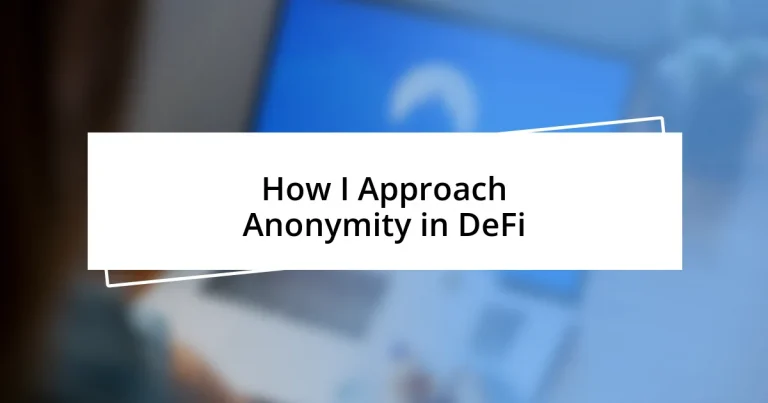Key takeaways:
- Anonymity in DeFi offers empowerment and privacy but also attracts bad actors, necessitating a balance between security and privacy.
- Key methods for achieving anonymity include using mixing services, privacy-focused cryptocurrencies, and decentralized identity solutions.
- The future of anonymity in DeFi will be shaped by the balance between user privacy and regulatory compliance, with community engagement playing a crucial role in innovation.
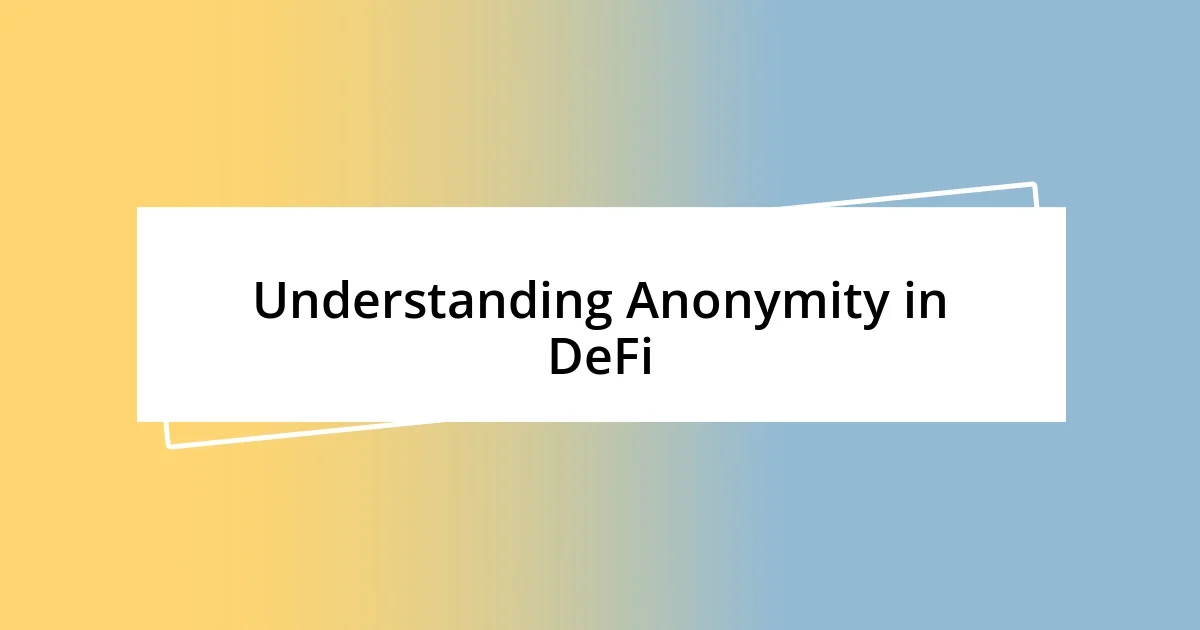
Understanding Anonymity in DeFi
Anonymity in DeFi (Decentralized Finance) strikes me as a double-edged sword. On one hand, it offers empowerment and privacy; on the other, it tends to attract bad actors who abuse the system. I remember my first DeFi transaction; I was exhilarated by the promise of anonymity, but that excitement quickly turned to apprehension when I read about the scams and hacks prevalent in this landscape.
What fascinates me about this space is how anonymity can act as a shield for personal data while also being a magnet for illicit activities. I often wonder if we can strike a meaningful balance between privacy and security. In discussions with fellow enthusiasts, I often highlight how knowing the power of anonymity can help investors make informed decisions while protecting their assets.
As I delve deeper into DeFi platforms, I find myself reflecting on how they handle user identity and transaction tracking. Platforms like Tornado Cash, for instance, utilize mixing services to enhance privacy but can complicate user accountability. This makes me ponder: are we ready for a world where full anonymity might hinder legitimate financial innovations? Understanding these nuances adds layers to my interactions with DeFi, allowing me to navigate this thrilling, yet precarious, financial frontier.
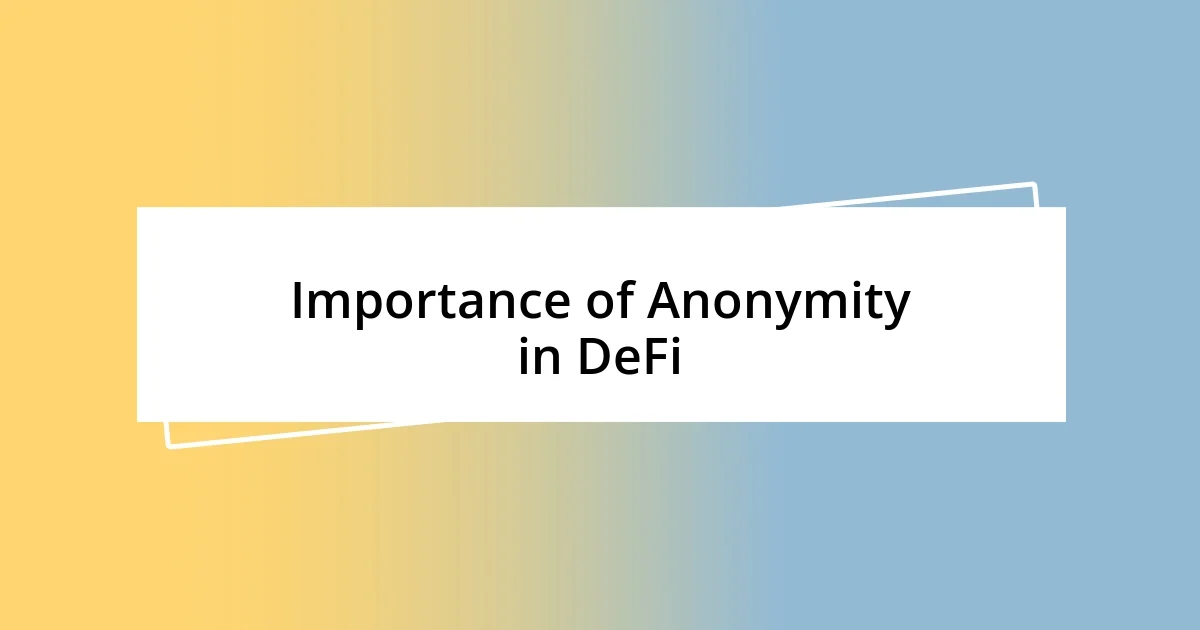
Importance of Anonymity in DeFi
Anonymity in DeFi plays a crucial role in allowing users to engage without the fear of scrutiny or identity theft. I remember the moment I first realized the significance of this aspect—it was during a late-night dive into blockchain forums when I came across stories of users who experienced breaches of privacy, leading to financial losses. The sheer idea that my transactions could remain my own, away from prying eyes, gave me a sense of autonomy I had longed for in traditional finance.
Here are some key points on why anonymity is so important in DeFi:
- Privacy Protection: Anonymity shields users from hackers keen on exploiting personal information.
- Empowerment: It enables individuals to control their financial identity, enhancing personal freedom.
- Reduced Censorship: Anonymity allows users to bypass oppressive regimes, giving them access to financial systems.
- Fostering Innovation: A sense of privacy encourages experimentation without the fear of judgment or repercussion.
- Encouragement of Honest Participation: Individuals can engage in discussions or transactions without the fear of social stigma or retribution.
In my experience, when I reflect on the true power of anonymity, I see a vibrant community of innovators and changemakers emerging, unafraid to explore new financial avenues.
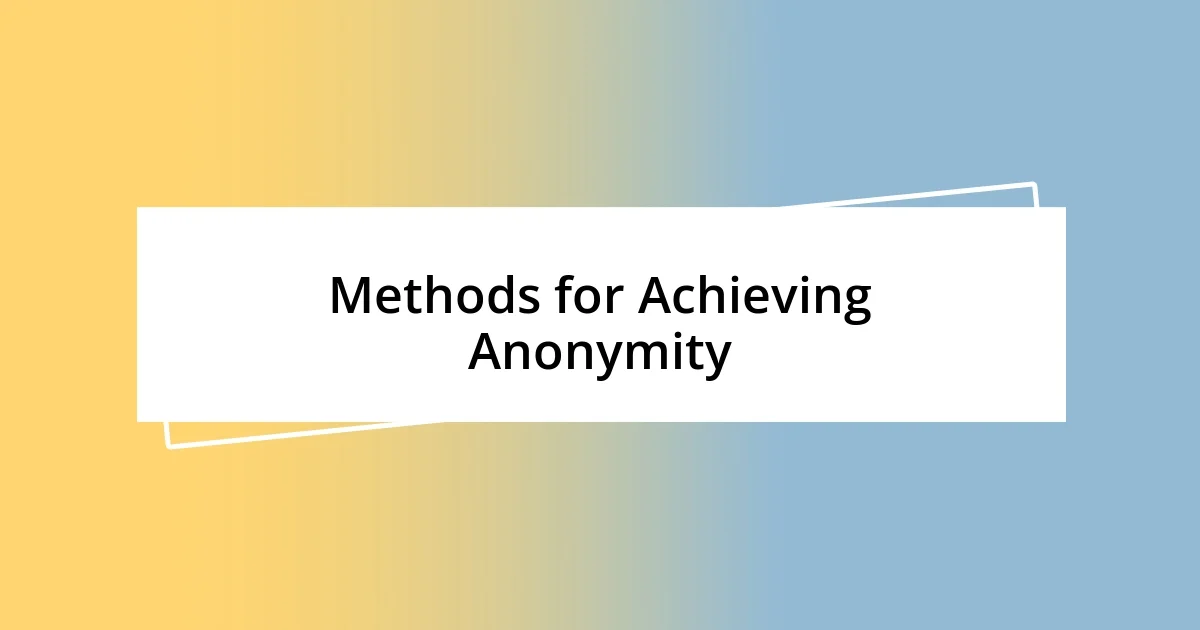
Methods for Achieving Anonymity
Achieving anonymity in DeFi can be approached through various methods, each with its unique implications and levels of security. One of my preferred methods involves using mixing services like Tornado Cash. I’ve had experiences where I would send my funds through a mixer, breaking the connection between my wallet and the transaction history. It’s like tossing your coins into a whirlpool; they come out on the other side, but their original path is obscured.
Another approach I’ve found intriguing is utilizing privacy-focused cryptocurrencies, such as Monero or Zcash. These coins incorporate advanced cryptographic techniques, such as zero-knowledge proofs, to maintain transaction integrity while keeping user identities hidden. The first time I exchanged Monero, I felt an exhilarating sense of freedom; it was reassuring to know that my transactions wouldn’t be easily traceable, which can indeed be liberating.
A less common but fascinating method is the implementation of decentralized identity solutions. These systems use smart contracts to create a secure digital identity, providing users more control over what information to share. I remember discussing this with a friend who works with blockchain tech, and we both agreed that this could potentially revolutionize how we perceive anonymity. Instead of hiding our identities completely, we’d have the power to selectively disclose information, an encouraging step towards a balance between privacy and transparency.
| Method | Description |
|---|---|
| Mixing Services | Breaks the link between a user’s wallet and transactions, enhancing privacy. |
| Privacy-Focused Cryptocurrencies | Utilizes cryptographic techniques to hide user identity and transactions. |
| Decentralized Identity Solutions | Allows users to control their digital identity, selectively disclosing information. |
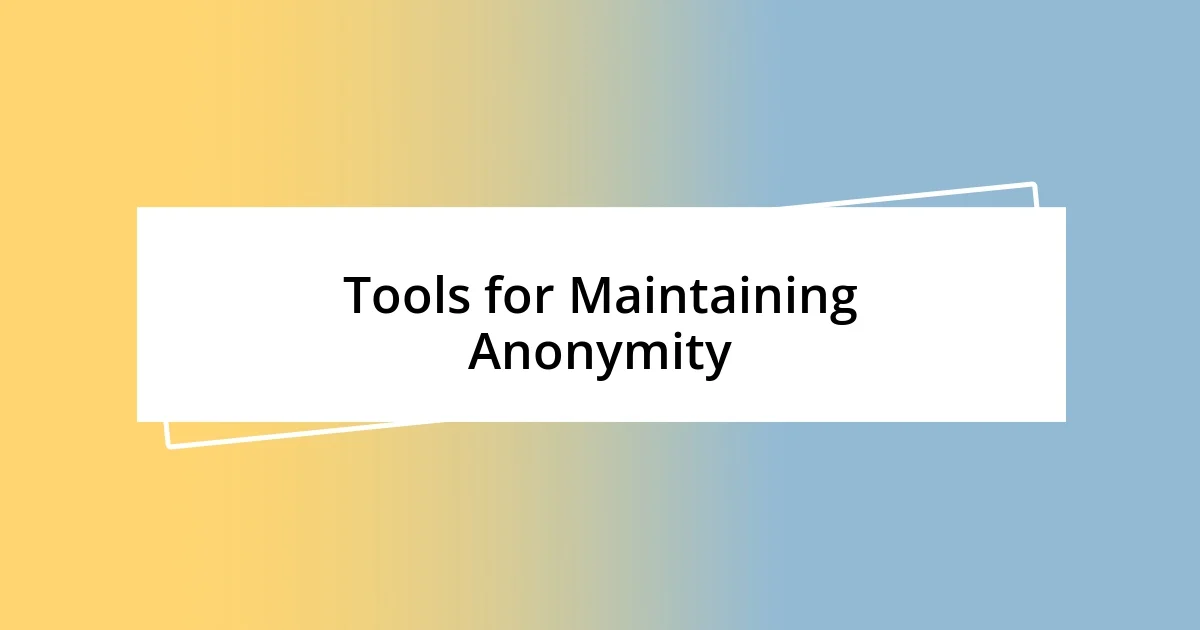
Tools for Maintaining Anonymity
Using tools to maintain anonymity in DeFi is like wielding a powerful shield against unwanted exposure. One tool I frequently rely on is Virtual Private Networks (VPNs), which mask my IP address. I still recall that nervy moment when I connected to a public Wi-Fi and felt a wave of unease wash over me. VPNs change that narrative—transforming my digital footprint so that I can explore DeFi platforms without compromise.
Another option I often recommend is utilizing decentralized exchanges (DEXs), which don’t require centralized control or personal info to trade. Last summer, while experimenting with a new DEX, I felt a rush of excitement realizing I could swap tokens seamlessly, without submitting personal data. It’s liberating! The anonymity that comes with DEXs allows me to engage without looking over my shoulder, something I find both practical and empowering.
Finally, I can’t overlook the importance of anonymity-enhancing wallets. They work wonders by separating my identity from my crypto holdings. I remember feeling a sense of relief when I switched to a wallet that offers enhanced privacy features; it felt like stepping into a safe haven. These wallets often integrate alongside the other tools, creating a layered defense that keeps my financial activities discreet. Isn’t it empowering to know that such tools are at our disposal?
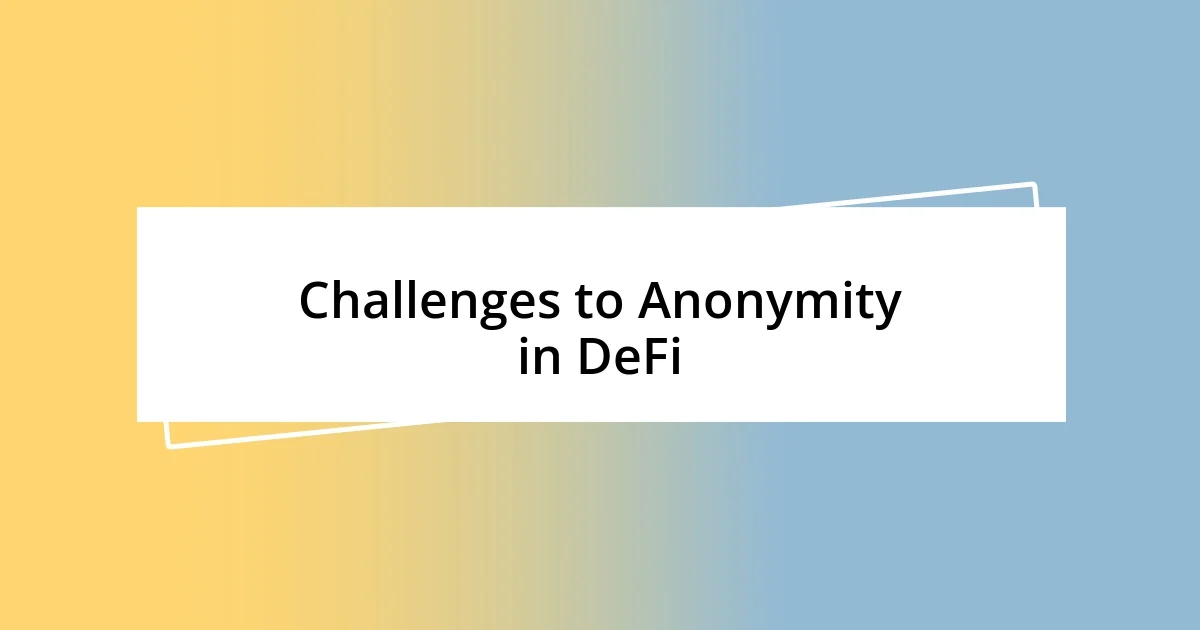
Challenges to Anonymity in DeFi
Challenges to anonymity in DeFi are multifaceted and often arise from the very technologies that support it. For instance, even the most advanced mixing services might leave behind breadcrumbs that could tie a user back to their original wallet. It’s like trying to erase a chalkboard while someone is watching closely—no matter how hard you try, there might be traces left behind.
Then, of course, there’s the issue of regulatory scrutiny. Governments worldwide are increasingly interested in tracking transactions to combat illicit activities. I often wonder how much longer we can hold onto the idea of full anonymity when institutions like the Financial Action Task Force (FATF) insist on transparency. It brings a certain tension; the freedom that DeFi offers sits in stark contrast to the demands for accountability in traditional finance.
Lastly, user behavior plays a significant role in jeopardizing anonymity. I’ve noticed that many individuals still use the same wallets for both private and public transactions. It’s a common mistake, and it can expose a whole financial identity. I can’t help but ponder: how many of us understand the repercussions of our actions? Before diving into DeFi, it’s crucial to consider how every keystroke might leave a digital footprint that could betray our anonymity.
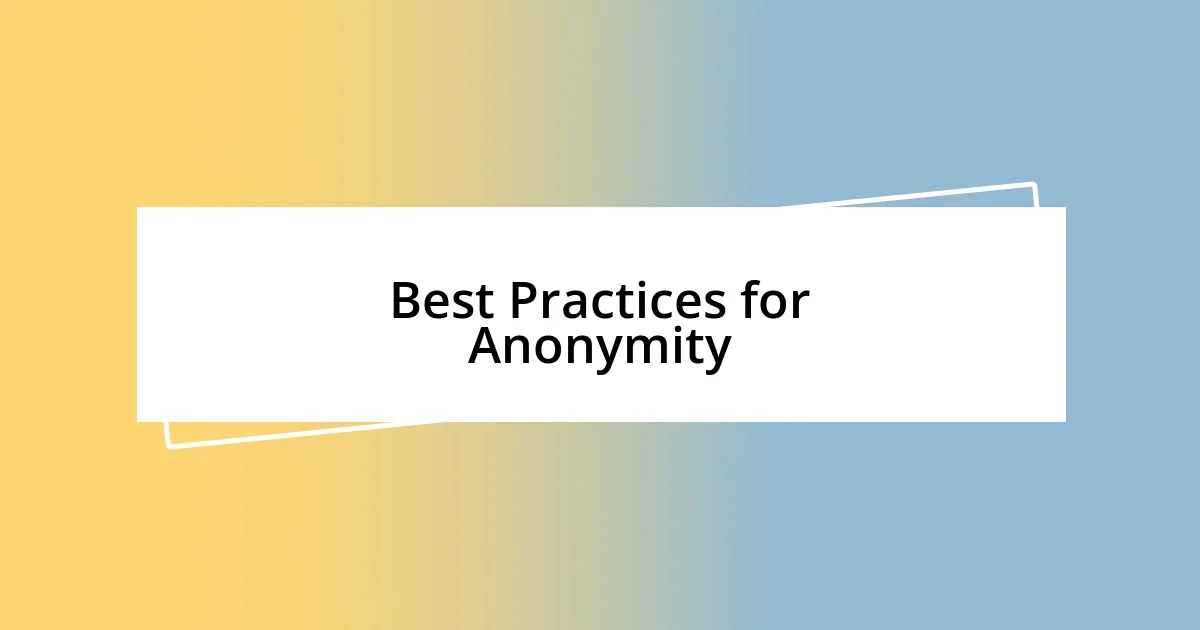
Best Practices for Anonymity
Maintaining anonymity in DeFi isn’t just about using the right tools; it’s also about adopting smart practices. One of the most effective tips I’ve learned is to create multiple wallets for different purposes. I remember setting up a dedicated wallet just for smaller trades; it felt like a layer of armor against unwanted scrutiny. This way, if one wallet is compromised, my entire crypto life isn’t put at risk. Doesn’t it make sense to spread that risk around?
Moreover, I’ve found that regularly rotating keys and changing addresses is crucial. It’s akin to shifting your physical mail to a new address every few months—this simple act can drastically reduce the likelihood of someone tracking your transactions. I still recall the relief I felt after ensuring that my addresses weren’t fixed in stone; it’s a reminder that in the digital realm, change can often be your best friend. Are we doing enough to consider that our digital lives are as dynamic as our physical ones?
Lastly, I can’t stress the power of education enough. I often immerse myself in DeFi resources and forums to stay updated on emerging practices and potential threats. It’s like being part of a close-knit family, where sharing tips can save you from major pitfalls. Just the other day, I came across a discussion on avoiding common traps, and it made me reflect on how easily deception lurks in anonymity. Isn’t it fascinating how knowledge can be one of the most powerful tools in our anonymity arsenal?
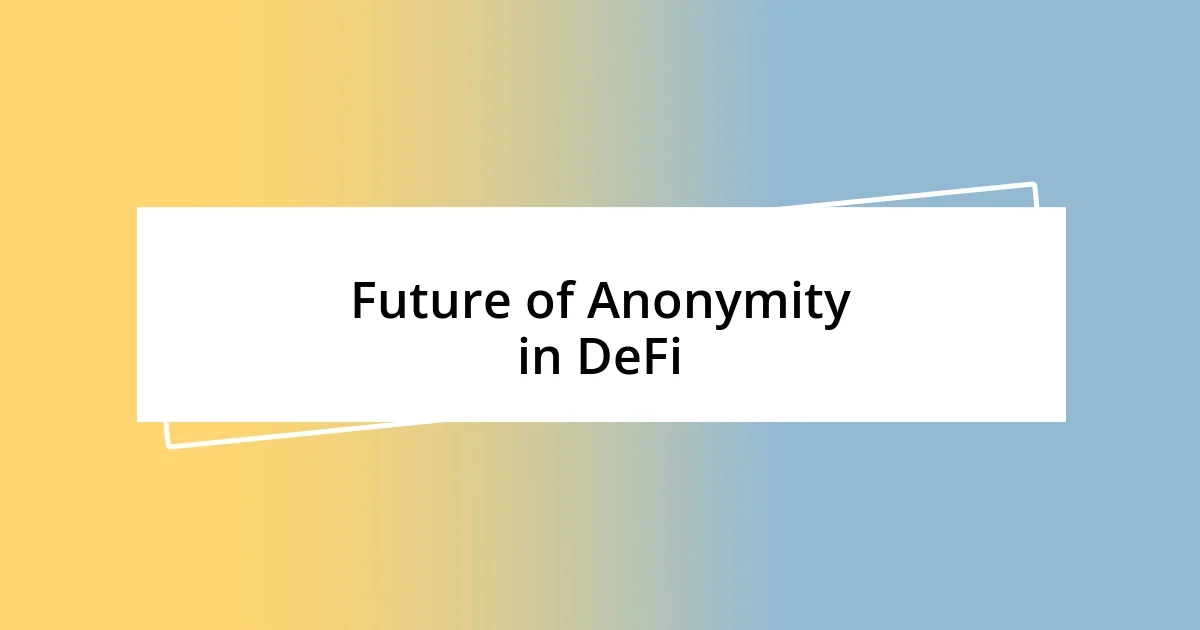
Future of Anonymity in DeFi
The future of anonymity in DeFi is a topic that evokes both excitement and caution for me. As new privacy-enhancing protocols emerge, I can’t help but feel a mix of optimism and skepticism. For instance, zero-knowledge proofs have the potential to mask transaction details while proving validity. I wonder, though: will these advancements be enough to satisfy regulators, or will they merely lead to new ways of tracking?
I often think about the inevitable clash between user privacy and regulatory compliance. As the pressure to monitor transactions ramps up, I see a future where DeFi platforms may introduce initiatives to balance both sides. I remember a discussion I had with a developer who is passionate about creating solutions that enhance privacy without sacrificing security. The notion that we could build a more aware system excites me. Can we find that delicate balance before it’s too late?
Looking ahead, I’m curious about the role community engagement will play in shaping DeFi’s landscape. I’ve been involved in countless forums, absorbing various perspectives, and it becomes evident that collective knowledge can drive innovation. The power of community could pave the way for robust tools that prioritize anonymity. But I ask myself: are we ready to embrace these changes while safeguarding our personal freedoms? The answer will define how future generations approach DeFi.












